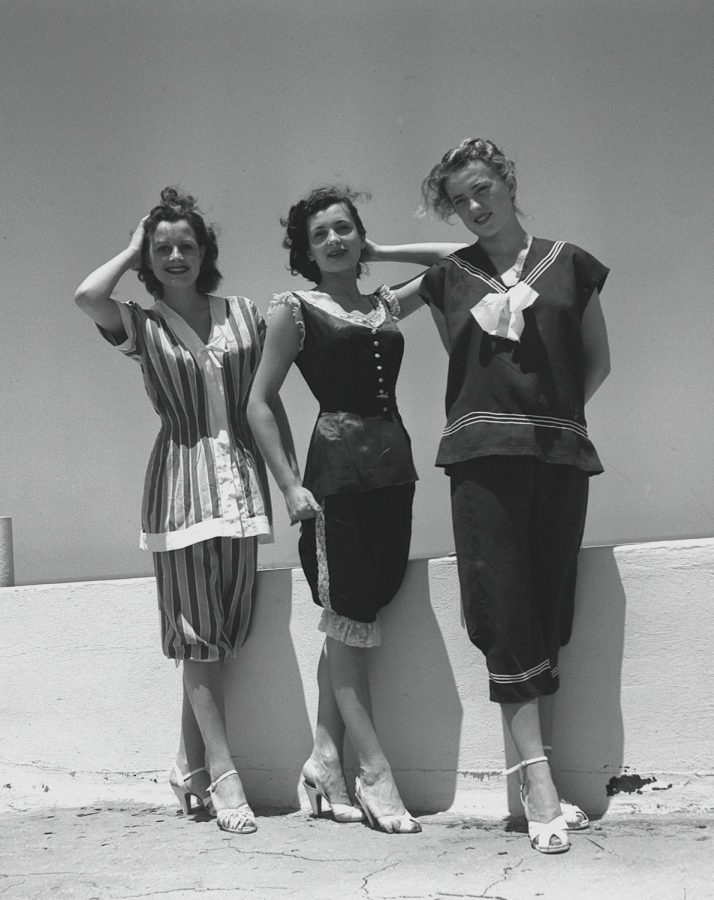The Subjective Social Complex of the Female Hierarchy Needs to be Amended (Part Two)
Hans Pinn
Three women pose for a beauty contest photo in Israel in the early 1950s. Photo courtesy of Hans Pinn.
September 22, 2021
We would all like to think that we aren’t part of an agenda that keeps old-fashioned views in place, but we are. I used to think that I was this hyper feminist who could do no wrong, though the truth is the problem is so much more deeply rooted in all of us than we realize. For example, I find myself passing people in the hallway and analyzing how pretty I find them, subconsciously seeing where they fit into my hierarchy. The hard truth is that many women do this, they value the traits they find desirable in themselves in other women.
It all starts with the media. From a very young age, we all knew what look was considered “in,” and what type of girl was in fashion. I remember watching Disney Channel and wanting to wear what Teddy Duncan or Lizzie Mcguire had on. This value of the superficial has been ingrained in us since we were little. Now more than ever, with the rise of social media influencers, it’s hard not to feel like you’re missing something, missing what she’s wearing, or missing the life she seems to have. Because of that, women are pitted against each other. We have all these labels, such as indie, alt, basic, and goth. Whatever group we seem to fall into is what we think is the best. We find ourselves looking for other people who fit into “our group.” For the longest time, I felt that because I was indie, I was better than the basic girls. I sought out friends and companions who had the same look because they were one of us. The media has made this far too normalized.
The real catalyst for most of the tropes and labels we know today is early film and media. Dating back to even silent films, there was always a damsel in distress or a temptress trying to lure an “innocent man.” These portrayals of women trickled down into how we see ourselves and the way we see and label the women around us. We’ve grown up looking at examples of bimbos, the dumb blonde, the ugly but smart girl, and so many more cliches.
Media and film have always been controlled and dominated by men dating back to Hollywood and the “golden age” of film. Even today, almost every aspect of the industry is run by men, from directors to agents and producers. Because of this phenomenon, when male writers write female characters, they’re often one-dimensional stereotyped depictions that only men think are accurate. There’s often little room for female characters that have layers. These female characters’ essences are often categorized down to their appearance. If the character just so happens to be blonde, pretty, and popular, she often embodies superficial and conceited tendencies associated with dumb blondes and cheerleaders. Additionally, the problems these female depictions face are limited to things like boys, what to wear, and popularity. It’s as if men and society think this is all we care about, that these are the most important issues we have. The essence of a woman is boiled down to this subjective collection of assumptions, labels, and stereotypes.
When little boys and girls grow up watching media that depicts women in that light, it’s damaging. It creates this negative cycle of ignorance generationally. For us girls and women, it pits us against each other. It limits our perceptions and impressions of the women around us. It allows us to dumb down the entire persona of a woman to something as simple as a label, like being a prude, basic, or stupid.
All of this culminates into the hierarchy we have in our minds, who we think is better than us, and who we think we’re better than. The truth is we’re all the same, we all have issues, and we all have drama. There’s no label you can put to take that truth away. Yet, we have this societal issue within ourselves, an issue that after all this time has yet to be amended or resolved. We want to be perceived as beautiful, smart, and desirable, but we are told that that’s unrealistic and made to believe we have to fit a certain mold. Do we blame society, or do we blame ourselves for perpetuating these things still? The answer to that is entirely up to you.



